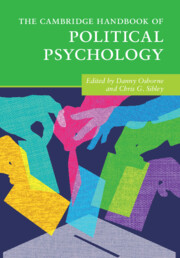Book contents
- The Cambridge Handbook of Political Psychology
- The Cambridge Handbook of Political Psychology
- Copyright page
- Dedication
- Contents
- Figures
- Tables
- Contributors
- Part I Foundations of Political Psychology
- Part II The Politics of Intergroup Attitudes
- 11 Authoritarianism
- 12 A Political Psychology of Ethnocentrism
- 13 Collective Narcissism
- 14 Demographic Change, White Decline, and the Changing Nature of Racial Politics in Election Campaigns
- 15 Macro-diversity and Intergroup Attitudes
- 16 The Persistence of Gender in Campaigns and Elections
- 17 The Politics of Abortion, Pregnancy, and Motherhood
- 18 Religiosity and Openness to Authoritarian Governance
- 19 The Consequences of Moral Conviction in Politics
- 20 The Political Psychology of National Identity
- 21 The Political Dynamics of Immigration Opinion Worldwide
- 22 International and Individual Differences in Support for Human Rights
- Part III Contemporary Challenges to Democracy
- Part IV Diversifying Perspectives in Political Psychology
- Index
- References
13 - Collective Narcissism
How Being Narcissistic about Your Groups Shapes Politics, Group Processes, and Intergroup Relations
from Part II - The Politics of Intergroup Attitudes
Published online by Cambridge University Press: 17 February 2022
- The Cambridge Handbook of Political Psychology
- The Cambridge Handbook of Political Psychology
- Copyright page
- Dedication
- Contents
- Figures
- Tables
- Contributors
- Part I Foundations of Political Psychology
- Part II The Politics of Intergroup Attitudes
- 11 Authoritarianism
- 12 A Political Psychology of Ethnocentrism
- 13 Collective Narcissism
- 14 Demographic Change, White Decline, and the Changing Nature of Racial Politics in Election Campaigns
- 15 Macro-diversity and Intergroup Attitudes
- 16 The Persistence of Gender in Campaigns and Elections
- 17 The Politics of Abortion, Pregnancy, and Motherhood
- 18 Religiosity and Openness to Authoritarian Governance
- 19 The Consequences of Moral Conviction in Politics
- 20 The Political Psychology of National Identity
- 21 The Political Dynamics of Immigration Opinion Worldwide
- 22 International and Individual Differences in Support for Human Rights
- Part III Contemporary Challenges to Democracy
- Part IV Diversifying Perspectives in Political Psychology
- Index
- References
Summary
Collective narcissism is a belief in the greatness of one’s social group, accompanied by a conviction that others do not appreciate the in-group enough. In this chapter, we review empirical studies which elucidate the antecedents and consequences of collective narcissism. Collective narcissism is thought to compensate for frustrated individual needs. Thus, those high in collective narcissism are more concerned with how their group reflects on them, rather than with caring for other in-group members. Accordingly, collective narcissism is associated with readiness to defend the in-group image from criticism but also using in-group members for personal gains. Furthermore, collective narcissism predicts negative out-group attitudes, extensive sensitivity to intergroup threats, conspiracy beliefs, intergroup hostility, and support for violent extremism. We discuss the implications of collective narcissism for voting and public policy, showing that it is associated with support for populist parties and politicians, anti-environmental policies as well as problematic public health policies.
- Type
- Chapter
- Information
- The Cambridge Handbook of Political Psychology , pp. 214 - 227Publisher: Cambridge University PressPrint publication year: 2022
References
- 1
- Cited by



